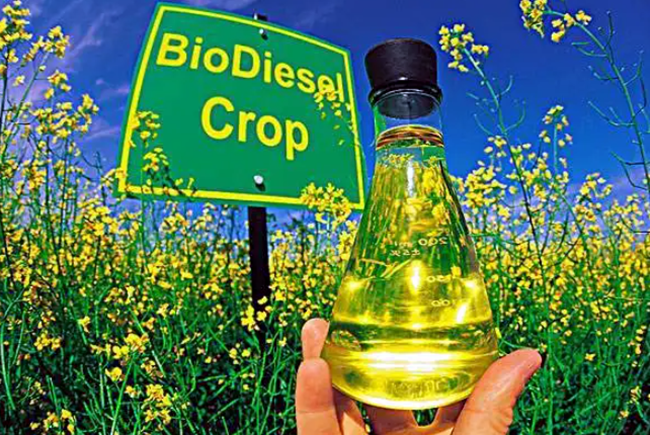Biodiesel can be used in various industries, including transportation, construction, mining, and agriculture. In addition, biodiesel has been used in portable generators to provide power to remote areas. Some companies offer conversion kits, which enable a diesel generator to run on different fuels. These kits also include high-pressure fuel injection pumps, which can help to extend the life of this equipment. As a renewable energy source, many people are wondering what the difference is between biodiesel and the most commonly used petrochemical diesel, and whether it can replace diesel and be used directly in engines without causing damage. Today, Gosun is here to answer those questions for you.
Biodiesel refers to the renewable diesel fuel produced and processed by transesterification process using oil crops, aquatic plant oils, animal oils and catering waste oils as raw materials. Compared with petrochemical diesel, biodiesel has environmental protection, low-temperature start-up, good lubricity, safety, renewable and other excellent performance, especially the combustion of biodiesel is generally better than petrochemical diesel, combustion residue is slightly acidic, which prolong the service life of catalyst and engine oil. In daily life, a certain proportion of biodiesel mixed with petrochemical diesel can reduce fuel consumption and exhaust pollution.

Advantages of biodiesel
- Renewable fuel, non-toxic,
- Wide range of sources, including animal fats, agro-industry residues, and forest biomass.
- Enhanced lubricity, less wear to the engine
- Biodegradable, almost pollution-free to the environment
Some biodiesel generators can be designed to operate on a variety of biodiesel blends. Generally, biodiesel generators are designed to operate on a biodiesel blend of at least twenty percent. So, can diesel generators run directly on biodiesel? It is found that the mixture of 20% biodiesel and 80% petrochemical diesel can be used without any changes to the engine of the diesel generator set, and has little impact on the power, economy and durability of the engine set. This blend will have a similar torque and horsepower as petroleum diesel but will have 1% to 2% less energy per gallon.
Using biodiesel in diesel generators can offer advantages. It offers a renewable source of power, reducing the need for petroleum-based fuels. Using biodiesel in a diesel generator will help reduce emissions. This is important for air quality, but the emission benefit is proportional to the blend level. Using biodiesel can also increase the life of fuel injectors, high pressure fuel injection pumps, and other equipment. In addition, biodiesel can also be used in portable generators.
However, using biodiesel in a diesel generator can also present some challenges. For example, biodiesel has a higher water content than traditional diesel, which can inhibit lubrication and corrosion. The water content also promotes bacteria growth, which can result in engine failure. Also, if stored for long periods of time, biodiesel can cause engine malfunctions.
Cold weather can also present problems for biodiesel. Biodiesel forms crystals in cold weather, which can plug filters or cause engine problems. These issues can also be mitigated by using a fuel filter heater or engine block heater. Also, some biodiesel types form crystals at lower temperatures than others. The most desirable fatty acid for biodiesel is oleic acid, while linoleic acid is the least desirable.
When running biodiesel in a diesel generator, the most important precautions to take are to properly filter the biodiesel and to store the fuel properly. Biodiesel must be filtered to ensure that it does not contain harmful substances. Also, biodiesel can form crystals at lower temperatures, which can plug filters or cause engine problems. Biodiesel should be stored in a drying tank. If stored in a cold storage area, biodiesel can form crystals and clog filters, which can affect the performance of the engine. Many engines and generators are designed to run on petroleum diesel, so biodiesel may not be suitable for your engine. If you are running a generator that is designed to run on biodiesel, consult your manufacturer’s manual to find out which blends are recommended.



